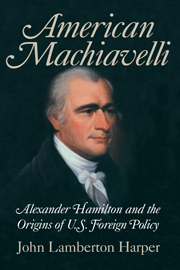Book contents
- Frontmatter
- Contents
- List of Illustrations
- Acknowledgments
- Miscellaneous Frontmatter
- Introduction
- PART I THE COMING OF NECESSITY
- PART II BATTLE LINES ARE DRAWN
- PART III SEIZING THE HELM
- PART IV INFORMAL ADVISER TO THE PRINCE
- 12 Return to Not-So-Private Life, 1794–1795
- 13 “Camillus” into the Breach
- 14 A High-Stakes Game: Washington’s Farewell Address, 1796
- 15 Transition to the New Regime, 1796–1797
- PART V A PRINCE IN HIS OWN RIGHT?
- PART VI THE LESSER OF EVILS
- Conclusion: Hamilton Then and Now
- Notes
- Bibliography
- Index
12 - Return to Not-So-Private Life, 1794–1795
Published online by Cambridge University Press: 05 April 2013
- Frontmatter
- Contents
- List of Illustrations
- Acknowledgments
- Miscellaneous Frontmatter
- Introduction
- PART I THE COMING OF NECESSITY
- PART II BATTLE LINES ARE DRAWN
- PART III SEIZING THE HELM
- PART IV INFORMAL ADVISER TO THE PRINCE
- 12 Return to Not-So-Private Life, 1794–1795
- 13 “Camillus” into the Breach
- 14 A High-Stakes Game: Washington’s Farewell Address, 1796
- 15 Transition to the New Regime, 1796–1797
- PART V A PRINCE IN HIS OWN RIGHT?
- PART VI THE LESSER OF EVILS
- Conclusion: Hamilton Then and Now
- Notes
- Bibliography
- Index
Summary
Rebellion and Retirement
At the end of May 1794, Hamilton wrote the president that he had delayed his resignation because of the recent crisis but was prepared to depart immediately if Washington so desired. The president answered, “I am pleased that you have determined to remain at your Post until the clouds over our affairs, which have come on so fast of late, shall have dispersed.” In June, the House of Representatives cleared Hamilton of the charge of misappropriation of funds. His troubled relations with Washington were back on an even keel.
In fact, as new clouds gathered, Washington’s reliance on Hamilton was destined only to increase. After mid-1794, the administration’s main concern was no longer war with Britain or the Indians, but unrest of a different sort. Infuriated by a federal excise tax on the universal practice of distilling whiskey and forced to defend themselves against violations in a federal court in far-off Philadelphia, hard-bitten, hard-drinking Scotch-Irish settlers in the four westernmost counties of Pennsylvania took the law into their own hands. On July 16, 1794, some five hundred members of local militia units attacked and destroyed the lightly defended estate of the Pittsburgh-area excise inspector. The stills of those who dared to pay the tax went up in flames. Federal authority in the region temporarily collapsed.
- Type
- Chapter
- Information
- American MachiavelliAlexander Hamilton and the Origins of U.S. Foreign Policy, pp. 153 - 162Publisher: Cambridge University PressPrint publication year: 2004



